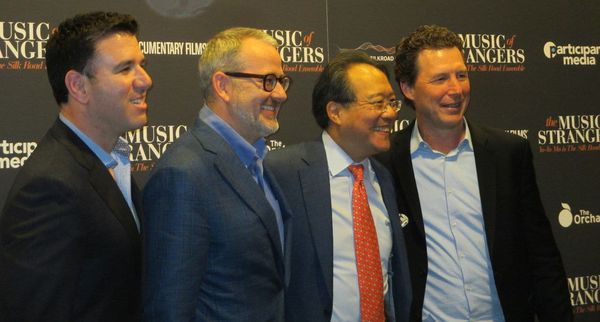 |
| The Orchard's Paul Davidson, Morgan Neville, Yo-Yo Ma and Sony's Dennis Kooker Photo: Anne-Katrin Titze |
Introducing Gay Talese, the author of The Voyeur's Motel (to be adapted for the screen by Krysty Wilson-Cairns, directed by Sam Mendes and produced by Steven Spielberg's DreamWorks) and Morgan Neville, the Oscar-winning director of 20 Feet From Stardom, at Lotos Club, created a Music Of Strangers conversation that lead to Alexander Payne's producer Jim Burke (Downsizing, The Descendants and Election) for A Beautiful Game, the Marx Brothers, Best Of Enemies, Keith Richards: Under the Influence and Joan Didion in Shotgun Freeway: Drives Through Lost L.A.
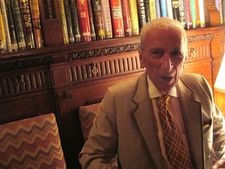 |
| Gay Talese on The Music Of Strangers: "This is a major international film!" Photo: Anne-Katrin Titze |
Darlene Love, Richard Gere and Barbara Kopple hosted the after party where Cristina Pato, Kojiro Umezaki, Colin Jacobsen, Shane Shanahan, Joseph Gramley, Evan Ziporyn, Johnny Gandelsman, Sandeep Das, Abigail Washburn, Logan Coale, Nicholas Cords with Yo-Yo Ma gave a performance.
Cristina Pato, Kinan Azmeh, Kayhan Kalhor, Wu Man and Yo-Yo Ma form the core group of the Silk Road Ensemble and in Morgan Neville's The Music Of Strangers their personal experiences transform into a far-reaching pursuit.
Anne-Katrin Titze: Gay, meet Morgan! Morgan, meet Gay!
Gay Talese: These great musicians [in The Music Of Strangers] are so devoid of politics, confronted with politics, hurt by politics - the man [Kayhan Kalhor] who can't see his wife in Tehran - it shows you how humanity can work internationally if we didn't have these political people that divide us. Your film is a major political message. This is a great film. You are a great man.
Morgan Neville: Thank you. If I can just geek out for a moment - I started my career as a journalist because I was under the sway of New Journalism and I read so much of what you wrote.
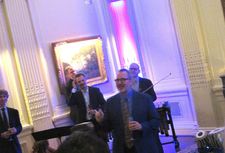 |
| Morgan Neville introduces the Silk Road Ensemble Photo: Anne-Katrin Titze |
GT: This is your night and I'm so glad to be at the party tonight. This is a great film. You said it took four and a half years [in Morgan's introduction]?
MN: Did you see my last film? It was the Gore Vidal, William Buckley film. Best Of Enemies.
GT: No. This is major work, major.
MN: It was hard. This was not an easy film to make.
AKT: What was the most difficult part of it for you?
MN: Production was difficult because the ideas were so big. You could have made ten different films. So we just had to pick a direction and go, you know.
GT: The history of China - the Cultural Revolution - this little lady [Wu Man] works her way through that. You look at Yo-Yo Ma's father with the double-breasted suit. Going to Paris. Look at the way he is dressed! The Chinese people with this adorable iconic woman think they are the creator of rock 'n roll. You have these great scenes! And you're moving back and forth and back and forth. You're a genius. We saw a film last night called Genius about Thomas Wolfe. You're genius!
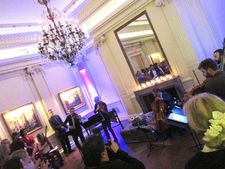 |
| The Silk Road Ensemble with Yo-Yo Ma at Lotos Club Photo: Anne-Katrin Titze |
MN: Thank you. Coming from you that's high praise.
GT: Anything I can do to help promote it, because maybe a lot of people won't be able to … Your film is just amazingly wonderful.
MN: I want people to find the film. That's what it's all about.
AKT: Just that one shot of the Syrian refugee camp [with Kinan Azmeh] speaks volumes.
MN: We didn't even talk about this …
GT: The little scene of the Shah in the carriage ...
MN: Actually, today is the first day - [to me] I don't know if I mentioned this to you - that we dubbed the film into Arabic.
AKT: No, you didn't mention it.
MN: We started screening it in refugee camps today. So Kinan, who is in the film, is in Jordan today, screening it at a refugee camp in Arabic. That's amazing that the film is already screening in refugee camps.
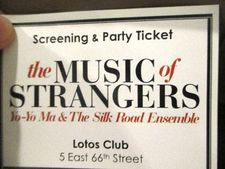 |
| The Music Of Strangers invitation Photo: Anne-Katrin Titze |
AKT: There is a strand in your film where the musicians discuss living in a country far from where they were born. How you imagine a country, how the language when you return is no longer the same language. How do you relate to this? Where are you from?
MN: I'm native to California.
AKT: Where you live now.
GT: And where you were born?
MN: Yes. In fact, I live on the block that I went to kindergarten on. I lived here in New York for years, I went to school back East but I went full circle all the way back to where I came from.
GT: You have a very international consciousness.
MN: I mean, I travelled since I was a small child.
GT: Do you have any musical background?
MN: And I played music since I was a child.
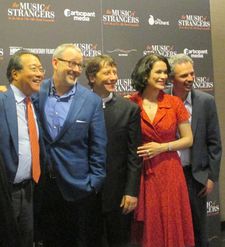 |
| Yo-Yo Ma, Morgan Neville, Shane Shanahan, Cristina Pato and Colin Jacobsen Photo: Anne-Katrin Titze |
GT: What instrument?
MN: Everything from upright bass to guitar and piano. I played music for decades.
GT: The origin of this production, what was it? Was it a book?
MN: No. I had a couple of bottles of wine with Yo-Yo the first time we met. That was it.
GT: How did you ever meet Yo-Yo?
MN: He called me … I mean, I've made a lot of music films and somebody had said, you should talk to this guy about shooting your concert. And so I met with him about shooting a concert and we ended up deciding to make a documentary that night.
AKT: You mentioned the project to me when we were talking about 20 Feet From Stardom.
MN: Yes, I started this while we were making 20 Feet.
GT: Yo-Yo Ma was born in France, you said. We saw that handsome father he had. We don't know enough of his father. He was a musician, or not?
MN: Yes, musician, but more of a teacher, professor.
 |
| Kinan Azmeh in the Syrian refugee camp |
GT: So Yo-Yo Ma comes from what we would call an aristocratic background?
MN: Yes. His father played violin. During World War II when they had the blackouts in Paris, he would play the violin in the neighborhood.
GT: So his father moved to France, what's the year?
MN: 1938.
GT: Before the war. Before Mao took over, which was 1948. So Yo-Yo Ma's father wanted to get the hell out of there before the revolution was over. And he goes to Paris? With the mother?
MN: Yes.
GT: Did he have any siblings? Did they all go to Paris? So they spoke Mandarin or Cantonese?
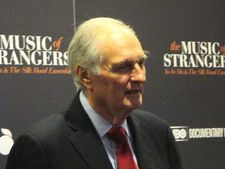 |
| Alan Alda at The Music Of Strangers première Photo: Anne-Katrin Titze |
MN: He has one sister. Yes. So English is his third language. Chinese they spoke at home. French they spoke where he grew up. Yo-Yo speaks Mandarin still. He studied in a French school but then he came to New York and grew up totally American - but with all those other influences at home.
AKT: The women of his family don't come up in the film at all. The mother, the sister.
MN: The sister - you see her in the beginning when he is seven years old, playing. That's his sister playing on piano with him.
AKT: His wife isn't in the film?
MN: She isn't. She is here tonight. She wouldn't go on camera.
AKT: I love the beginnings of your films. The Baldessari [in 20 Feet From Stardom] was great. Keith Richards [in Under The Influence] you have walking through the forest. Here you have a shot of the apartment and there is what looks like a Picasso drawing on the wall. Do you remember the scene with the police man looking at the Picasso in Hitchcock's Suspicion? That's what it made me think of.
 |
| Kayhan Kalhor: "… who can't see his wife in Tehran" |
MN: That's great.
GT: Let me ask you, this is a masterwork in your career. What are your aspirations for it? I would like for everyone in America to see this film. How do you make that happen?
MN: Eventually, next year, it's going to go on HBO. We're negotiating. It's going to get a lot of international distribution.
GT: You are at the cusp of a great career!
AKT: He won an Oscar already.
GT: Fuck the Oscar! This is a major international film!
MN: It's going to be interesting. We are negotiating to distribute it in China. The number of American documentaries that get released in China is about zero.
GT: It's great for China, great for the US. It transcends the China bashing from our government.
AKT: You said you took out some "intellectual" things in the editing. What were those about? Musical theory?
 |
| Cristina Pato in The Music Of Strangers |
MN: You could talk about musical intonation and similarities in instruments. A lot of that stuff and a lot of these ideas. It's interesting, but it really belongs in a book more than a film. At the end of the day, it was too much talking about rather than experiencing. They were great interviews … What I loved about being a journalist - and I always say I never stopped being a journalist when I became a filmmaker - is that I'm curious. It's the most important trait to have as documentary filmmaker.
GT: You have chosen wise characters and a major and significant purpose. This is not frivolous. It's more important than we actually realize. When you see it first, you see the beauty of your production. Inspired, apolitical, but very political at the same time.
AKT: Do you ask yourself the question that is brought up a lot in the film - what does it mean? Why am I doing this?
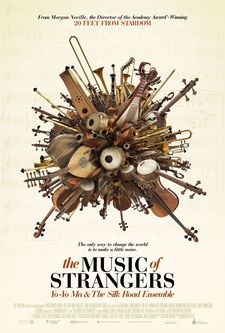 |
| The Music Of Strangers Poster |
NM: Oh, sure. When you make films about art. Earlier in my career, when you start things and you think - why am I doing this?
AKT: Not anymore, though?
NM: It's gotten easier. I have a lot more choice about what I want to do now. Because of the "damned Oscar" - it made it a lot easier for me to raise money.
AKT: So what's coming up?
NM: I'm actually doing a scripted movie this fall. A Hollywood feature [A Beautiful Game]. It's an original script by a screenwriter whom I've known and admire. It's actually a black comedy. About big issues. About what it means to be an adult.
GT: From a script?
NM: Yes. There was a TV show called Casual. The guy that created that show [Zander Lehmann]. A young writer. Alexander Payne's producer introduced me to him.
AKT: Which one of his producers?
NM: JIm Burke. He now runs Focus Features. So Jim called me and said I've got a script, I like you, I'll pay for it, let's make this film. Little windows of opportunity.
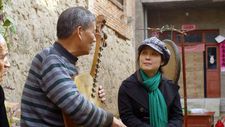 |
| Gay Talese on Wu Man: "The history of China - the Cultural Revolution - this little lady works her way through that." |
AKT: What kind of movies did you like growing up?
NM: As a young child, I was obsessed with the Marx Brothers. But then I went on to Film Noir.
GT: What was your first documentary?
NM: My first documentary was an LA history documentary called Shotgun Freeway - Drives Through Lost LA. Joan Didion is in it, a bunch of other people are in it.
Read what Yo-Yo Ma and Morgan Neville had to say at the New York premiere of The Music Of Strangers: Yo-Yo Ma & The Silk Road Ensemble.
The Music Of Strangers is in cinemas across the UK from November 18.





















